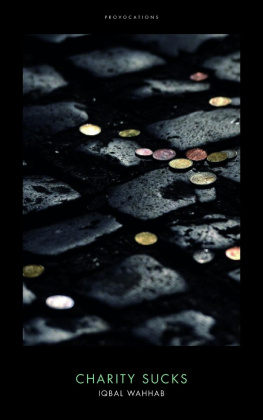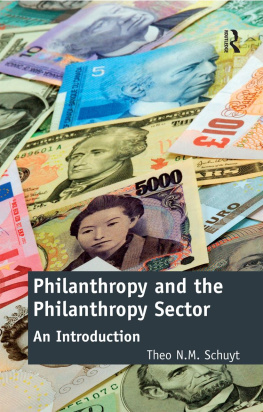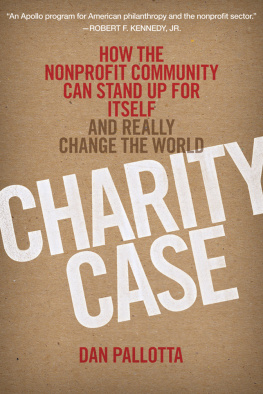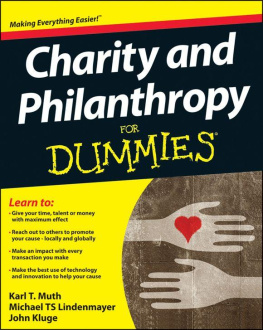C HARITY SUCKS. As provocations go, thats quite a severe one.
Im a self-made businessman, fully conscious of the fact that I could still be living in a ramshackle village in Bangladesh if my parents had not had the good fortune to make it to Britain. Had I not had a lucky break, I could have been like the other kids at my south London school who got into crime and drug addiction and ended up either in prison or dying at a tragically young age. I view my life as a series of lucky breaks. As my business career has developed over the years, Ive always been conscious not just of where I can go next, but also of where I have come from and whos still there. So, in the past, Ive done the usual thing of writing cheques to noble causes. Ive also sat on the boards of many of these charities, and have chaired quite a few too.
Ive closely watched for over a decade the inside machinations of the charity world and the promise of doing good things. Ive been instrumental in raising, directly and indirectly, probably quite a few million pounds over the years for charitable projects, and Roast, the restaurant I created a decade ago, has donated a significant six-figure sum for various causes since it started. So Im not a greedy capitalist skinflint seeking to justify my reluctance to recognise our responsibility as global citizens. Even the most miserly, tight-fisted businesspeople I know privately undertake huge philanthropic activity.
I have witnessed up close and personal the occasional successes but mostly the massive failures of projects we feel we are obliged to support because they sound so fantastic and make us feel so good for getting behind them. I have taken enough tables at black-tie dinners, competing with others in the bidding for gifts we dont want or need while eating dreadful rubber chicken and enduring speeches going on late into the night, invariably against a backdrop of pictures of dispossessed and starving children while wine seamlessly flows in the fanciest West End hotels, to justify my position.
This is not a simple diatribe against charities and their practitioners. I am writing this book because I have identified a new path, one that even a few years ago would have been unthinkable, romantic, delusional. It starts with the recognition that business is the ultimate tool to save the planet. Capitalism is in the process of its final reinvention; it is becoming complete while charities become obsolete.
Put simply, charity sucks because business does it better.
G ROWING UP IN south London in the 1960s and 70s, I didnt adhere to the conventional migrant parent expectation that their children study hard to take up a respectable profession; instead, an unruly childhood led me to run a gang, which successfully indulged in many illegal activities.
School was a trading centre for me, not a place of learning, and so, unsurprisingly, I, along with the other gang members, failed my O Levels. I turned my life around after receiving a gentle nudge from my liberal parents and ended up in university after all much to everyones relief. The other members of the gang received no such nudges. Two ended up in prison, one committed suicide and another was killed. The rest have, at best, led unremarkable lives. They were all as smart as I was, some more so. Which is why Ive used whatever successes I have achieved with ventures such as the Cinnamon Club and Roast to help open up opportunities for all.
My parents got the only scholarships in their part of what is now Bangladesh to go to university and they flourished enough academically to make it out of the desperate poverty they were in, which I would have inherited if they hadnt been well on the day of their scholarship exams or someone had out-performed them. So today I go to developing countries such as Togo and invest in the slum dwellers, encouraging them to study business and trade their way out of poverty. Many have successfully done so, and have repaid the loans given to them, which have in turn helped future generations of entrepreneurs.
These are not acts of Victorian-style noblesse oblige, where the rich occasionally bestow money on the poor out of a sense of civic duty and feelings of pity. They are driven by the recognition of flaws on the part of the state in collecting our taxes and using them wisely to repair an unfettered markets inequalities. The failure of unregulated capitalism, followed by the failure of the public sector, led to the creation of the third sector based on the hopeless, ill-thought-out view that charities can make the world OK. Time and again we see how misplaced that blind hope has been.
And I say all this as a left-leaning individual who sees capitalism as a force for good.
Alternative capitalism
A project called Mums the Chef in Croydon is an example of how the future can be different in the hands of business. It came about as a result of the introduction of the disgraceful benefits cap, which in other London boroughs had led to families with more than three kids being broken up and sent out to live in less populous parts of the country if they were on state aid. Sahara Quli, a social entrepreneur, saw a business opportunity; she enrolled the mothers of these families, who had never worked (for a wage, that is), at the local catering college, where they secured qualifications to enable them to first get zero-hours contracts and then more permanent ones through catering jobs she arranged.
In its first year, thirty women have found work for the first time, and not only have they become empowered to take control of their lives, the project has saved the state over 3 million in benefits. In the past, these women would have been the subject of sympathy or pity. Instead of continuing to be socially isolated, they have become commercially engaged and empowered through employment.
Heres another example of how commercial lenses see situations differently and lead us to act in more impactful ways: Im sitting in what must be one of the grimmest places on earth. The slum dwelling of Katanga in the beleaguered West African state of Togo is insufferably hot, bringing out the worst of the nearby open sewers, which, blended with the fish being smoked and dried outside the hut of the residents committee I have come to visit, make me for once thankful that I recently lost my sense of smell.
The more time I spend in Katanga, the angrier I become, and the target of my anger is a French charity that had been there previously and had written up a community plan that they promised the residents committee would, if followed, lead them to a better life. I quickly leafed through the plan. It said they just needed sanitation, a school, a hospital and clean water. Once they had all that, it said, their lives would be fine. Naturally the residents clutched to this as their way out of their current circumstances. I told them the bad news as I saw it: namely, that this wasnt a plan but merely a list and if they tried to do everything on it, they would fall flat on their faces.
The authors of this so-called plan believed their vision just needed money and all would be fine.
We walked around the slums and visited a run-down house they called a hospital. We need a fence, the head of the residents committee told me. I asked him why and he said in order to keep the kids out. Why did he want to keep the kids out? I asked. Can you guess the answer? Thats right, because it said so in the plan. And how much would this miracle fence cost? I ask. 8,000. Eight. Thousand. Pounds. Oh, do I want to meet the authors of that report.
This is the cosy world of failure, inhabited by well-meaning charities and well-meaning philanthropists, that I want to bust wide open.
I know, too, that there will have been many wealthier folk than I who visited Katanga and who would have been similarly struck by the god-awful conditions in which these amazingly resilient people subsist. And these people would have, out of compassion, written a cheque in the seemingly safe assumption that they were doing some good. They would never have known, because scrutiny is tiresome, that far from empowering the people of Katanga, the money would have instead been used to build an entirely pointless fence. Once back in their safe haven of West End afternoon tea circuits, they would be extolling their virtues to friends at having contributed to something so meaningful.






